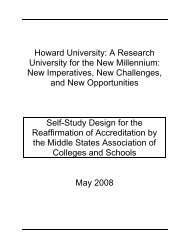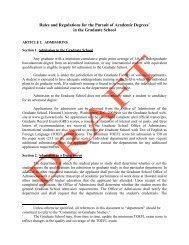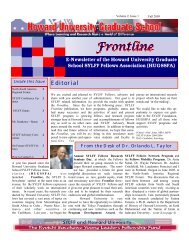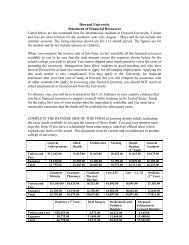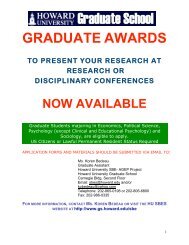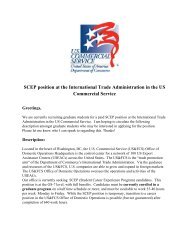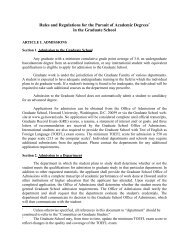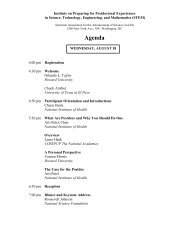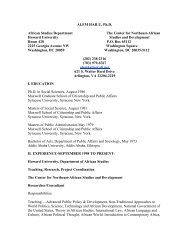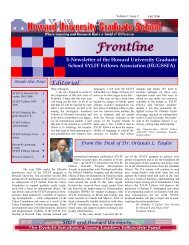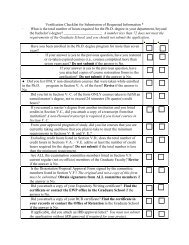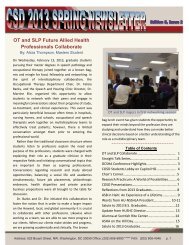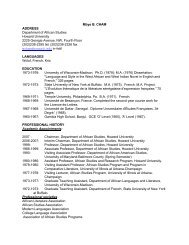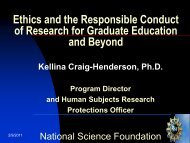Stephanie A. Johnson, Esq. Kamilah Woodson-Coke, Ph.D
Stephanie A. Johnson, Esq. Kamilah Woodson-Coke, Ph.D
Stephanie A. Johnson, Esq. Kamilah Woodson-Coke, Ph.D
You also want an ePaper? Increase the reach of your titles
YUMPU automatically turns print PDFs into web optimized ePapers that Google loves.
Ethical Issues in<br />
the Academy<br />
<strong>Stephanie</strong> A. <strong>Johnson</strong>, <strong>Esq</strong>.<br />
stejohnson@howard.edu<br />
<strong>Kamilah</strong> <strong>Woodson</strong>-<strong>Coke</strong>, <strong>Ph</strong>.D<br />
kwoodson@howard.edu
How to handle an illegal question<br />
1. Answer the question<br />
2. Refuse to answer the question/tell the<br />
interviewer that the question is illegal<br />
3. Consider how the question relates to the job,<br />
and respond to that.
Basic Faculty Ethical Issues<br />
! Plagiarism<br />
! Contributions<br />
! Data<br />
! Conflict of Interest<br />
! Responsible Research<br />
! Harassment<br />
! Non discrimination/Fair evaluation<br />
! Allegations of ethical misconduct
Plagiarism<br />
Representing the ideas,<br />
words, or data of<br />
another person or<br />
persons as one’s own.
Acknowledgement of Contributions<br />
Appropriately recognizing<br />
and acknowledging all of<br />
those persons who have<br />
contributed to the work.
Data Usage<br />
! Must acknowledge the source of<br />
the data and the method of<br />
collection.<br />
! Must not fabricate or falsify the<br />
data.
Conflict of Interest<br />
! Can be with research sponsored by a<br />
corporation or for profit entity, government,<br />
or non profit.<br />
! Must not let source or promise of funding<br />
affect methods of research or reporting of<br />
results.
Sexual Harassment<br />
! Pressure for sexual activity;<br />
! Unwelcome touching, patting, or hugging;<br />
! Forced sexual intercourse;<br />
! Unnecessary and unwelcome references;<br />
! Belittling or negative remarks about a person’s<br />
gender or sexual orientation;<br />
! Inappropriate sexual innuendos or humor;<br />
! Obscene gestures;<br />
! Offensive sexual graffiti, pictures, or posters;<br />
! Email and internet use that violates this policy.
Responsible Conduct of Research<br />
!Risks of Research<br />
!Informed Consent<br />
!Research Misconduct
Ethical Misconduct<br />
! Make yourself aware of the rules of your<br />
university or workplace.<br />
! Entitled to due process.<br />
! May be consequences outside of university.
Non-Discrimination and Fair<br />
Evaluation<br />
!Must not allow personal<br />
feelings to affect judgment<br />
of students’ work.
Other issues that you may encounter as<br />
a faculty member<br />
! Privacy/Confidentiality<br />
! Disgruntled Students<br />
! Students with Disabilities<br />
! Curriculum Issues
Student Privacy<br />
! Records are protected by Family Educational<br />
Rights and Privacy Act.<br />
! Parents have rights until the student turns 18,<br />
then rights transfer to student.
Students with Disabilities<br />
! Must be accommodated, may result in a<br />
modification of teaching.<br />
! Usually must be certified by a university<br />
office.
! Proportion<br />
! Consistency<br />
! Zero tolerance?<br />
Curriculum Issues
Academic Freedom<br />
A university may determine for itself<br />
on academic grounds who may teach,<br />
what may be taught, how it shall be<br />
taught and who may be admitted to<br />
study.<br />
Sweezy v. New Hampshire (1957)
General Ethical Guidelines<br />
Act in a manner that best serves the education and<br />
professional development of students<br />
Impartially evaluate student performance regardless of the student’s religion, race,<br />
gender, sexual orientation, nationality, or other criteria that are not germane to<br />
academic evaluation<br />
Maintain confidentiality in communication with students, taking care not to discuss<br />
a student’s performance, research results, or behavior with other students<br />
Serve on graduate student committees without regard to the race, gender, sexual<br />
orientation, or national origin of the graduate student candidate<br />
Prevent personal rivalries with colleagues from interfering with duties as graduate<br />
advisor, committee member, or colleague
Guidelines, cont.<br />
Discuss laboratory, studio, or departmental authorship policy with graduate<br />
students in advance of entering into collaborative projects<br />
Acknowledge student contributions to your research<br />
Familiarize yourself with policies that affect their graduate students<br />
Create an environment and provide opportunities within the graduate program<br />
for students to seek assistance for their grievances without threat of<br />
retaliation<br />
Respect the academic freedom for students to express opinions that may differ<br />
from those of faculty<br />
Ensure that a student’s experience as a teaching, research, or staff assistant<br />
contributes to his/her professional development and does not impede the<br />
student’s progress toward the degree



